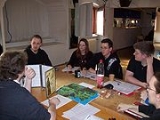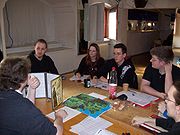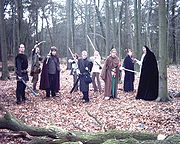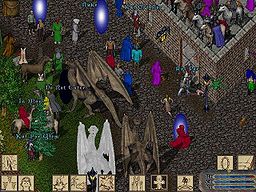
Role-playing game
Encyclopedia
A role-playing game is a game
in which players assume the roles of character
s in a fictional setting. Players take responsibility for acting out these roles within a narrative, either through literal acting
, or through a process of structured decision-making or character development. Actions taken within many games succeed or fail according to a formal system of rules
and guidelines.
There are several forms of RPG. The original form, sometimes called the tabletop RPG, is conducted through discussion, whereas in live action role-playing game
s (LARP) players physically perform their characters' actions. In both of these forms, an arranger called a game master (GM) usually decides on the rules and setting to be used and acts as referee, while each of the other players plays the role of a single character.
Several varieties of RPG also exist in electronic media, including multi-player text-based
MUD
s and their graphics-based successors, massively multiplayer online role-playing game
s (MMORPGs). Role-playing games also include single-player offline role-playing video game
s in which players control a character or team who undertake quests, and may include capabilities that advance using statistical mechanics. These games often share settings and rules with tabletop RPGs, but emphasize character advancement more than collaborative storytelling.
Despite this variety of forms, some game forms such as trading card games and wargames
that are related to role-playing games may not be included. Role-playing activity may sometimes be present in such games, but it is not the primary focus. The term is also sometimes used to describe roleplay simulation games and exercises used in teaching, training, and academic research.
. Events, characters and narrative structure give a sense of a narrative experience, and the game need not have a strongly-defined storyline. Interactivity is the crucial difference between role-playing games and traditional fiction. Whereas a viewer of a television show is a passive observer, a player at a role-playing game makes choices that affect the story. Such role-playing games extend an older tradition of storytelling game
s where a small party of friends collaborate to create a story.
While simple forms of role-playing exist in traditional children's game
s of make believe, role-playing games add a level of sophistication and persistence to this basic idea with additions such as game facilitators and rules of interaction. Participants in a role-playing game will generate specific characters and an ongoing plot. A consistent system of rules and a more or less realistic campaign setting
in games aids suspension of disbelief
. The level of realism
in games ranges from just enough internal consistency to set up a believable story or credible challenge up to full-blown simulations of real-world processes.
. These types of games tend to minimize or altogether eliminate the use of dice or other randomizing elements. Some games are played with characters created before the game by the GM, rather than those created by the players. This type of game is typically played at gaming convention
s, or in standalone games that do not form part of a campaign.

Tabletop or pen-and-paper (PnP) RPGs are conducted through discussion in a small social gathering. The GM describes the game world and its inhabitants. The other players describe the intended actions of their characters, and the GM describes the outcomes. Some outcomes are determined by the game system, and some are chosen by the GM.
This is the format in which role-playing games were first popularized. The first commercially available RPG, Dungeons & Dragons
(D&D), was inspired by fantasy literature
and the wargaming
hobby and was published in 1974. The popularity of D&D led to the birth of the tabletop role-playing game industry, which publishes games with a wide variety of themes, rules, and styles of play.
This format is often referred to simply as a role-playing game. To distinguish this form of RPG from other formats, the retronym
s tabletop role-playing game or pen and paper role-playing game are sometimes used, though neither a table nor pen and paper are strictly necessary.
 A LARP is played more like improvisational theatre
A LARP is played more like improvisational theatre
. Participants act out their characters' actions instead of describing them, and the real environment is used to represent the imaginary setting of the game world. Players are often costumed as their characters and use appropriate props, and the venue may be decorated to resemble the fictional setting. Some live action role-playing games use rock-paper-scissors
or comparison of attributes to resolve conflicts symbolically, while other LARPs use physical combat with simulated arms such as airsoft guns or foam weapons.
LARPs vary in size from a handful of players to several thousand, and in duration from a couple of hours to several days. Because the number of players in a LARP is usually larger than in a tabletop role-playing game, and the players may be interacting in separate physical spaces, there is typically less of an emphasis on tightly maintaining a narrative or directly entertaining the players, and game sessions are often managed in a more distributed manner.
 Online text-based role-playing game
Online text-based role-playing game
s involve many players using some type of text-based interface and an Internet connection to play an RPG. Games played in a real-time way include MUD
s, MUSH
es, and other varieties of MU*. Games played in a turn-based fashion include play-by-mail game
s and play-by-post games.
Massively multi-player online role-playing games (MMORPGs) combine the large-scale social interaction and persistent world
of MUDs with graphic interfaces. Most MMORPGs do not actively promote in-character role-playing, however players can use the games' communication functions to role-play so long as other players cooperate. The majority of players in MMORPGs do not engage in role-play in this sense.
Computer-assisted gaming
can be used to add elements of computer gaming to in-person tabletop role-playing, where computers are used for record-keeping and sometimes to resolve combat, while the participants generally make decisions concerning character interaction.
, however some multi-player video RPGs also allow for a participant to take on a GM role through a visual interface called a GM toolkit, albeit with abilities limited by the available technology.
Game
A game is structured playing, usually undertaken for enjoyment and sometimes used as an educational tool. Games are distinct from work, which is usually carried out for remuneration, and from art, which is more often an expression of aesthetic or ideological elements...
in which players assume the roles of character
Player character
A player character or playable character is a character in a video game or role playing game who is controlled or controllable by a player, and is typically a protagonist of the story told in the course of the game. A player character is a persona of the player who controls it. Player characters...
s in a fictional setting. Players take responsibility for acting out these roles within a narrative, either through literal acting
Acting
Acting is the work of an actor or actress, which is a person in theatre, television, film, or any other storytelling medium who tells the story by portraying a character and, usually, speaking or singing the written text or play....
, or through a process of structured decision-making or character development. Actions taken within many games succeed or fail according to a formal system of rules
Role-playing game system
A role-playing game system is a set of game mechanics used in a role-playing game to determine the outcome of a character's in-game actions...
and guidelines.
There are several forms of RPG. The original form, sometimes called the tabletop RPG, is conducted through discussion, whereas in live action role-playing game
Live action role-playing game
A live action role-playing game is a form of role-playing game where the participants physically act out their characters' actions. The players pursue goals within a fictional setting represented by the real world, while interacting with each other in character. The outcome of player actions may...
s (LARP) players physically perform their characters' actions. In both of these forms, an arranger called a game master (GM) usually decides on the rules and setting to be used and acts as referee, while each of the other players plays the role of a single character.
Several varieties of RPG also exist in electronic media, including multi-player text-based
Online text-based role-playing game
An online text-based role playing game is a role-playing game played online using a solely text-based interface. Online text-based role playing games date to 1978, with the creation of MUD1, which began the MUD heritage that culminates in today's MMORPGs...
MUD
MUD
A MUD , pronounced , is a multiplayer real-time virtual world, with the term usually referring to text-based instances of these. MUDs combine elements of role-playing games, hack and slash, player versus player, interactive fiction, and online chat...
s and their graphics-based successors, massively multiplayer online role-playing game
Massively multiplayer online role-playing game
Massively multiplayer online role-playing game is a genre of role-playing video games in which a very large number of players interact with one another within a virtual game world....
s (MMORPGs). Role-playing games also include single-player offline role-playing video game
Role-playing video game
Role-playing video games are a video game genre with origins in pen-and-paper role-playing games such as Dungeons & Dragons, using much of the same terminology, settings and game mechanics. The player in RPGs controls one character, or several adventuring party members, fulfilling one or many quests...
s in which players control a character or team who undertake quests, and may include capabilities that advance using statistical mechanics. These games often share settings and rules with tabletop RPGs, but emphasize character advancement more than collaborative storytelling.
Despite this variety of forms, some game forms such as trading card games and wargames
Wargaming
A wargame is a strategy game that deals with military operations of various types, real or fictional. Wargaming is the hobby dedicated to the play of such games, which can also be called conflict simulations, or consims for short. When used professionally to study warfare, it is generally known as...
that are related to role-playing games may not be included. Role-playing activity may sometimes be present in such games, but it is not the primary focus. The term is also sometimes used to describe roleplay simulation games and exercises used in teaching, training, and academic research.
Purpose
Both authors and major publishers of tabletop role-playing games consider them to be a form of interactive and collaborative storytellingStorytelling
Storytelling is the conveying of events in words, images and sounds, often by improvisation or embellishment. Stories or narratives have been shared in every culture as a means of entertainment, education, cultural preservation and in order to instill moral values...
. Events, characters and narrative structure give a sense of a narrative experience, and the game need not have a strongly-defined storyline. Interactivity is the crucial difference between role-playing games and traditional fiction. Whereas a viewer of a television show is a passive observer, a player at a role-playing game makes choices that affect the story. Such role-playing games extend an older tradition of storytelling game
Storytelling game
A storytelling game is a game where two or more persons collaborate on telling a spontaneous story. Usually, each player takes care of one or more characters in the developing story...
s where a small party of friends collaborate to create a story.
While simple forms of role-playing exist in traditional children's game
Children's games (role play)
Cowboys and Indians is a very old childhood game, with roots extending further back than even the romanticized historical period from which it springs...
s of make believe, role-playing games add a level of sophistication and persistence to this basic idea with additions such as game facilitators and rules of interaction. Participants in a role-playing game will generate specific characters and an ongoing plot. A consistent system of rules and a more or less realistic campaign setting
Campaign setting
A campaign setting is usually a fictional world which serves as a setting for a role-playing game or wargame campaign. A campaign is a series of individual adventures, and a campaign setting is the world in which such adventures and campaigns take place...
in games aids suspension of disbelief
Suspension of disbelief
Suspension of disbelief or "willing suspension of disbelief" is a formula for justifying the use of fantastic or non-realistic elements in literary works of fiction...
. The level of realism
Realism (arts)
Realism in the visual arts and literature refers to the general attempt to depict subjects "in accordance with secular, empirical rules", as they are considered to exist in third person objective reality, without embellishment or interpretation...
in games ranges from just enough internal consistency to set up a believable story or credible challenge up to full-blown simulations of real-world processes.
Varieties
Role-playing games are played in a wide variety of media ranging from the spoken tabletop form, to physically acting out characters in LARP or playing characters virtually in digital media. There is also a great variety of systems of rules and game settings. Games that emphasize plot and character interaction over game mechanics and combat sometimes prefer the name storytelling gameStorytelling game
A storytelling game is a game where two or more persons collaborate on telling a spontaneous story. Usually, each player takes care of one or more characters in the developing story...
. These types of games tend to minimize or altogether eliminate the use of dice or other randomizing elements. Some games are played with characters created before the game by the GM, rather than those created by the players. This type of game is typically played at gaming convention
Gaming convention
A gaming convention is a gathering that centered on role-playing games, collectible card games, miniatures wargames, board games, video games, or other types of games. These conventions are typically two or three days long, and often held at either a university or in a convention center hotel...
s, or in standalone games that do not form part of a campaign.
Tabletop

Tabletop or pen-and-paper (PnP) RPGs are conducted through discussion in a small social gathering. The GM describes the game world and its inhabitants. The other players describe the intended actions of their characters, and the GM describes the outcomes. Some outcomes are determined by the game system, and some are chosen by the GM.
This is the format in which role-playing games were first popularized. The first commercially available RPG, Dungeons & Dragons
Dungeons & Dragons
Dungeons & Dragons is a fantasy role-playing game originally designed by Gary Gygax and Dave Arneson, and first published in 1974 by Tactical Studies Rules, Inc. . The game has been published by Wizards of the Coast since 1997...
(D&D), was inspired by fantasy literature
Fantasy literature
Fantasy literature is fantasy in written form. Historically speaking, literature has composed the majority of fantasy works. Since the 1950s however, a growing segment of the fantasy genre has taken the form of films, television programs, graphic novels, video games, music, painting, and other...
and the wargaming
Wargaming
A wargame is a strategy game that deals with military operations of various types, real or fictional. Wargaming is the hobby dedicated to the play of such games, which can also be called conflict simulations, or consims for short. When used professionally to study warfare, it is generally known as...
hobby and was published in 1974. The popularity of D&D led to the birth of the tabletop role-playing game industry, which publishes games with a wide variety of themes, rules, and styles of play.
This format is often referred to simply as a role-playing game. To distinguish this form of RPG from other formats, the retronym
Retronym
A retronym is a type of neologism that provides a new name for an object or concept to differentiate the original form or version of it from a more recent form or version. The original name is most often augmented with an adjective to account for later developments of the object or concept itself...
s tabletop role-playing game or pen and paper role-playing game are sometimes used, though neither a table nor pen and paper are strictly necessary.
Live action

Improvisational theatre
Improvisational theatre takes many forms. It is best known as improv or impro, which is often comedic, and sometimes poignant or dramatic. In this popular, often topical art form improvisational actors/improvisers use improvisational acting techniques to perform spontaneously...
. Participants act out their characters' actions instead of describing them, and the real environment is used to represent the imaginary setting of the game world. Players are often costumed as their characters and use appropriate props, and the venue may be decorated to resemble the fictional setting. Some live action role-playing games use rock-paper-scissors
Rock-paper-scissors
Rock-paper-scissors is a hand game played by two people. The game is also known as roshambo, or another ordering of the three items ....
or comparison of attributes to resolve conflicts symbolically, while other LARPs use physical combat with simulated arms such as airsoft guns or foam weapons.
LARPs vary in size from a handful of players to several thousand, and in duration from a couple of hours to several days. Because the number of players in a LARP is usually larger than in a tabletop role-playing game, and the players may be interacting in separate physical spaces, there is typically less of an emphasis on tightly maintaining a narrative or directly entertaining the players, and game sessions are often managed in a more distributed manner.
Electronic media
Tabletop role-playing games have been translated into a variety of electronic formats. As early as 1974, the same year as the release of Dungeons & Dragons, unlicensed versions of it were developed on mainframe university systems under titles such as dnd and Dungeon. These early computer RPGs influenced all of electronic gaming, as well as spawning the role-playing video game genre. Some authors divide digital role-playing games into two intertwined groups: single player games using RPG-style mechanics, and multiplayer games incorporating social interaction.Single-player
Single player role-playing video games form a loosely defined genre of computer and console games with origins in role-playing games such as Dungeons & Dragons, on which they base much of their terminology, settings and game mechanics. This translation changes the experience of the game, providing a visual representation of the world but emphasizing statistical character development over collaborative, interactive storytelling.Multi-player

Online text-based role-playing game
An online text-based role playing game is a role-playing game played online using a solely text-based interface. Online text-based role playing games date to 1978, with the creation of MUD1, which began the MUD heritage that culminates in today's MMORPGs...
s involve many players using some type of text-based interface and an Internet connection to play an RPG. Games played in a real-time way include MUD
MUD
A MUD , pronounced , is a multiplayer real-time virtual world, with the term usually referring to text-based instances of these. MUDs combine elements of role-playing games, hack and slash, player versus player, interactive fiction, and online chat...
s, MUSH
MUSH
In multiplayer online games, a MUSH is a text-based online social medium to which multiple users are connected at the same time...
es, and other varieties of MU*. Games played in a turn-based fashion include play-by-mail game
Play-by-mail game
Play-by-mail games, sometimes known as "Play-by-post", are games, of any type, played through postal mail or e-mail. One example, chess, has been played by mail for centuries . Another example, Diplomacy, has been played by mail since the 1960s, starting with a printed newsletter written by John...
s and play-by-post games.
Massively multi-player online role-playing games (MMORPGs) combine the large-scale social interaction and persistent world
Persistent world
A persistent world is a virtual world that continues to exist even after a user exits the world and that user-made changes to its state are, to some extent, permanent...
of MUDs with graphic interfaces. Most MMORPGs do not actively promote in-character role-playing, however players can use the games' communication functions to role-play so long as other players cooperate. The majority of players in MMORPGs do not engage in role-play in this sense.
Computer-assisted gaming
Computer-assisted gaming
Computer-assisted gaming and computer-asssited wargaming refer to games which are at least partially computerized, but where on important part of the action is not virtual but performed in real life or on a miniature terrain. Regulation of the game can be done completely by a computer or partly...
can be used to add elements of computer gaming to in-person tabletop role-playing, where computers are used for record-keeping and sometimes to resolve combat, while the participants generally make decisions concerning character interaction.
Gamemaster
One common feature of many RPGs is the role of gamemaster, a participant who has special duties to present the fictional setting, arbitrate the results of character actions, and maintain the narrative flow. In tabletop and live action RPGs the GM performs these duties in person. In video RPGs many of the functions of a GM are fulfilled by the game engineGame engine
A game engine is a system designed for the creation and development of video games. There are many game engines that are designed to work on video game consoles and personal computers...
, however some multi-player video RPGs also allow for a participant to take on a GM role through a visual interface called a GM toolkit, albeit with abilities limited by the available technology.
See also
- Role-playing game termsRole-playing game termsRole-playing game terms are words used in a specific sense in the context of role-playing games. This includes both terms used within RPGs to describe in-game concepts and terms used to describe RPGs.- Terms used within games :...
- Gaming conventionGaming conventionA gaming convention is a gathering that centered on role-playing games, collectible card games, miniatures wargames, board games, video games, or other types of games. These conventions are typically two or three days long, and often held at either a university or in a convention center hotel...
s - Timeline of role-playing gamesTimeline of role-playing gamesThe following is a timeline of pen and paper role-playing games. For computer role-playing games see here.The years in brackets name the year of first edition in the original country of the game and not its first translation or adaptation in other countries. For next editions other than the first...
- List of role-playing game artists
- List of designers of role-playing games
- List of publishers of role-playing games
- List of role-playing games by name
- List of role-playing games by genre
- List of campaign settings
- Polish role-playing gamesPolish role-playing gamesPolish role-playing games have been in production since the early 1990s. Now there are several games that have been designed in Poland, as well as many translations on the market.- History :...
- Japanese role-playing gamesJapanese role-playing gamesJapanese role-playing games made their first appearance during the late 1980s. Today, there are hundreds of Japanese-designed games as well as several translated games...
External links
- RPG.Net - RPG community and database

